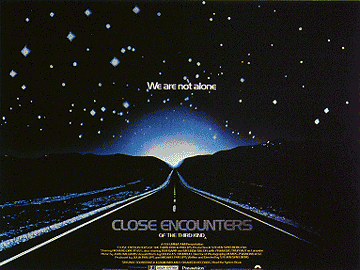Close Encounters of the Third Kind: A great movie tragically marred by Steven Spielberg's failure to engage in unprotected sex.
/I’ve been watching Close Encounters of the Third Kind again.

I have always thought of this film as flawless.
Slate’s Bill Wyman recently watched all of Spielberg's films and rated Close Encounters of the Third Kind as one of Spielberg’s best.
While I still agree that the film is excellent, fatherhood has unexpectedly changed one component of the movie for me, and unfortunately, it’s a big one.
Richard Dreyfuss’ character, Roy, in case you don’t remember, is the protagonist whose brief encounter with alien spaceships leaves an image implanted in his mind of the location where the aliens intend to land and make contact with representatives of the US and world government (an unnamed mountain in Wyoming). There are hundreds of people who are implanted with the same vision throughout the world, but Roy is one of only two people who actual make it to the mountain and manage to dodge the military in order to witness the arrival of the aliens.
It turns out there is a reason why the aliens want Roy at the landing site:
They want to take him with them. Although there is a team of jumpsuit-clad, government-trained soldiers ready to go with the aliens, these military bozos are rejected by the aliens.
Instead, Roy is the only one permitted to go.
He does. He boards the ship and the film ends with it lifting off into outer space.
One problem: Roy is married with kids.
Even though the marriage seems to have been going well until Roy becomes fixated on his vision of the mountain, I’ll give him a pass on abandoning his wife, since she leaves with the kids when Roy’s obsession causes him to build a ten foot tall dirt model of the mountain in his living room.
It’s not much of a pass, but I’ll give him a pass.
But Roy also has two kids. Sons. Boys who will not only never see their father again but will never know where he went.
Prior to being a father, this detail washed over me without notice. But with children of my own, this plot point now looms large in the film, and it causes a character who is supposed to be likable, honorable and revered to be considerably less so in my eyes.
As Roy prepares to board the ship, the lead scientist turns to him and says, “I envy you.”
Sitting alone in my living room, I actually said aloud, “Don’t envy the bastard. He’s abandoning his children. Probably forever.”
It’s an example how how parenthood can change your perspective on life forever.
Spielberg was not married and did not have children in 1977 when Close Encounters of the Third Kind was released. He would not have children for another decade, so it’s likely that the prospect of children had not even entered his consciousness yet.
I can’t help but wonder if things might have been different for Dreyfuss’ character if Spielberg had children at the time he made the film. Roy’s sons could have easily been removed from the film entirely with nothing substantial lost in terms of the story.
I suspect that Spielberg had a blind spot in 1977, and that allowed him to send his protagonist to space while his protagonist’s family remained behind, utterly forgotten.
There isn’t a single moment in the film when Roy even thinks about the prospect of leaving his family.
In a 2007 interview, Spielberg confessed that if he had a chance to make this movie today, Dreyfuss’ character would never have abandoned his family to go to outer space.
Was Spielberg blind to this flaw in his film because he did not have children of his own?
I suspect so. I suspect that I might have done the same thing.
If asked if I would abandon my wife and daughter today in order to be one of the first human beings to visit an alien world, I would say no without having to think twice.
But if asked ten years ago, prior to my marriage and the birth of my daughter, if I would have considered abandoning a hypothetical family in order to make a historic visit to an alien world, I might have said yes. I can envision myself making arguments about the magnitude and scope of such a journey in comparison to the commonality and frequency of fatherhood and marriage.
And I would have been foolish and naive and wrong.
Just as I suspect Spielberg was in 1977 when he sent his protagonist into space, leaving a family behind.